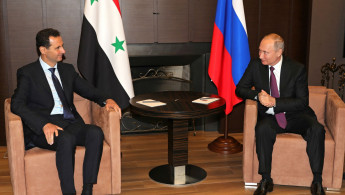Russia urges world powers to support Syria reconstruction aid
Russia urged world powers to help Syria's economic recovery and the return of refugees on Friday, as its Damascus ally pressed on with a campaign to re-take territory in the seven-year war.
Russian Deputy Ambassador Dmitry Polyansky appealed for an end to unilateral sanctions against Syria and said countries should not link aid to political demands for changes to President Bashar al Assad's regime.
Addressing the UN Security Council, Polyansky said the "revival of the Syrian economy" was a "critical challenge", with Syria facing an acute shortage of construction material, heavy equipment and fuel to rebuild areas destroyed by war.
"It would be wise for all international partners to join assistance in Syrian recovery efforts, to eschew artificial linkages to political momentum," Polyansky told the council meeting on Syria.
France, however, made clear there will be no reconstruction aid for Syria unless Assad agrees to a political transition that would include a new constitution and elections.
No EU aid
Moscow's 2015 military intervention in support of Assad was widely seen as a turning point in the war, which has killed more than 350,000 people and displaced millions.
Eight rounds of UN-sponsored peace talks on Syria have failed to yield a breakthrough while a new Russian-backed committee to rewrite the Syrian constitution has yet to begin work.
Since the last round of peace talks broke down in December, Assad's forces have retaken Eastern Ghouta, near the capital Damascus, and brought most of Daraa province in the south under their control.
French Ambassador Francois Delattre told the council that Assad was scoring "victories without peace" and that political talks were needed on a final settlement.
"We will not take part in the rebuilding of Syria unless a political transition is effectively carried out with constitutional and electoral processes" conducted "in a sincere and meaningful way," said Delattre.
A political transition is a "sine qua non" condition for stability, he said, adding that without stability, "no reason can justify France and the European Union's financing of reconstruction efforts."
Russia this month presented the United States with proposals for the return of refugees from Jordan, Turkey, Lebanon and Egypt that would involve international financial support.
New legislation, known as law number 10, would allow the Syrian government to confiscate the property of refugees and displaced Syrians unless they register ownership with the authorities in 30 days.
Polyansky shot back at criticism of the new law, saying the measure was the target of an "information campaign" and that Syrian authorities were ready to hold talks with UN experts on the issue.
Refugee return will be discussed at a meeting next week in Russia's Black Sea resort of Sochi between Russia, Iran and Turkey.
Russia entered the Syria war in 2015 and helped turn back a series of defeats for the Assad regime.
Russian airstrikes helped the Syrian regime and its foreign militia allies win a series of victories over the rebels and Islamic State group.
More than 6,000 civilians, including 1,761 children, have been killed by Russian forces, with Russian offensives conducted with the Syrian regime and Iran displacing some 2.5 million people, the Syrian Network for Human Rights (SNHR) says.
Moscow has cemented a military presence in Syria, with the build-up of at least two Russian bases in the country.
On Thursday, Assad said that Russian forces were needed in the country long-term, Russian news agencies reported, citing an interview with the leader.





 Follow the Middle East's top stories in English at The New Arab on Google News
Follow the Middle East's top stories in English at The New Arab on Google News
![The UAE is widely suspected of arming the RSF militia [Getty]](/sites/default/files/styles/image_330x185/public/2024-11/GettyImages-472529908.jpg?h=69f2b9d0&itok=Yauw3YTG)
![Netanyahu furiously denounced the ICC [Getty]](/sites/default/files/styles/image_330x185/public/2024-11/GettyImages-2169352575.jpg?h=199d8c1f&itok=-vRiruf5)
![Both Hamas and the Palestinian Authority welcomed the ICC arrest warrants [Getty]](/sites/default/files/styles/image_330x185/public/2024-11/GettyImages-2178351173.jpg?h=199d8c1f&itok=TV858iVg)